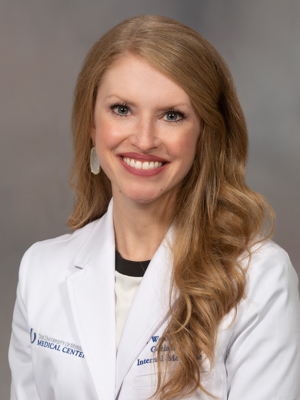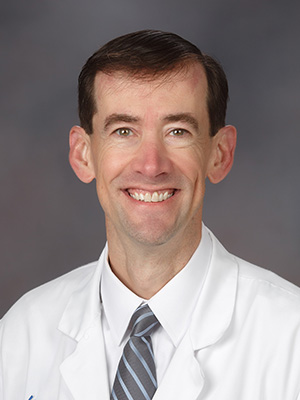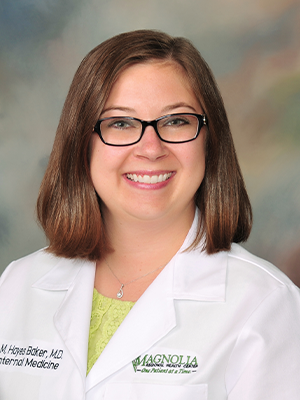Bowing out of bias: Project aims to foster trust in doctors
Published on Monday, September 20, 2021
By: Gary Pettus, gpettus@umc.edu
Three friends who graduated from medical school together nearly a decade ago have reunited to treat a condition that may afflict many of their fellow physicians: patient mistrust.
Dr. Lyssa Weatherly and Dr. Jessica Lavender, on faculty at the University of Mississippi Medical Center, have joined their former classmate, Dr. Hayes Baker of Corinth, on a multi-year project they hope will make residents more aware of physician bias in primary care.
In turn, patients’ confidence in the medical treatment they receive would strengthen and grow – serving, in the long run, to keep more doctors in physician-strapped Mississippi.
 Weatherly
Weatherly“For some of the patients we take care of, there is a big difference between our backgrounds and theirs,” said Weatherly, assistant professor of internal medicine in the Division of Geriatrics and Gerontology.
“Sometimes, as a physician, you have to win them over by showing them how much you deeply care about them in spite of the differences. I’m really hoping the work this grant funds will let us focus on helping residents establish much more solid relationships with patients.”
“This grant,” a $20,000 award from five professional organizations and foundations, was announced earlier this summer; it is shared by UMMC and Magnolia Regional Health Center in Corinth, where Baker is the internal medicine program director.
It is one of 32 projects and training programs receiving awards in locations from Oregon to New Hampshire, and one of only five highlighted in a press release from the Alliance for Academic Internal Medicine, one of the funders.
Baker, Weatherly and Lavender, assistant professor of general internal medicine and hypertension, wrote the grant proposal – their first ever: Enhancing Education, Building Trust, and Eliminating Bias in Primary Care.
With grant resources, they are building a curriculum, lecture series and more for internal medicine residents trained at UMMC and at Magnolia. Although the funding period is two years, Baker, Lavender and Weatherly hope to build a foundation that will help sustain the curriculum well beyond that, Baker said.
 Thigpen
Thigpen“These three physicians really deserve every bit of credit for the grant,” said Dr. Calvin Thigpen, associate professor of internal medicine and program director of the internal medicine residency program at UMMC.
“One of the things I hope comes out of this will be a better understanding of our patients’ backgrounds. Because we as physicians may have different perspectives from our patients, it’s important to learn how to communicate with them better.
“It’s about understanding where they come from.”
Research suggests that stereotypes physicians may apply to certain groups, even unconsciously, can shape the decisions they make when treating a patient; this may contribute to inconsistencies and disparities in the delivery of health care.
And at least one study has shown that among 29 industrialized countries, the United States ranked near the bottom compared to the others when it comes to public trust of doctors as a group.
But Americans are conflicted. In general, they have faith in their own doctors, but, compared to people in other countries, are less likely to trust the medical profession.
For an example, Thigpen points to the cost of medicine. “When a physician prescribes medicine that costs a fair amount of money, the thinking of the patient may be: ‘Is spending that much going to benefit my life enough to be worth it?’” Thigpen said.
“What the health care system asks patients to pay may be more than they expect, or more than they believe they can afford. So, for us as physicians, explaining why a certain therapy can help is our job.”
 Baker
BakerA big reason for seeking the grant, Baker said, was the hope that the work it supports will encourage more physicians to seek a permanent place in Mississippi.
“Our state has so few physicians,” said Baker, who, like Lavender and Weatherly, graduated from medical school in 2012.
A report published last year estimates that, by 2030, Mississippi will have the most severe physician shortage ratio among all the states. All but two of the state’s 82 counties have been designated as Medically Underserved Areas.
By teaching residents how to better communicate with patients, to establish better relationships with them, Baker said, “we hope they will want to stay and take care of the same population they took care of during their training.”
That goes for internal medicine residents at both UMMC and Magnolia; the two institutions, which are sharing the grant, also share a residency exchange program.
Residents taught by Lavender, who directs the Primary Care Track for the internal medicine program at UMMC, have the opportunity to see patients at Magnolia and gain experience working in a relatively rural setting.
Baker’s residents who are interested in fellowships – advanced training – are able to come to Jackson and do rotations in their chosen field at UMMC, the only academic medical center in the state.
Thanks to the grant, the residents will also get a better picture of patients’ lives beyond the clinic. “For the most part, residents have no idea what a patient’s life is like in their home,” Weatherly said.
“Seeing where a patient lives and what their home life is like is a big area we have been missing in primary care training.” But not anymore; the grant enabled a partnership with home health agencies and hospices. Now, residents will be able to accompany those agencies’ nurses on patient visits.
“Ideally,” Weatherly said, “we are going to embed into these communities residents who will be on the front lines of primary care. The grant is meant to build trust, and what better way to do that than to show patients that we want to come into your home and learn how to take better care of them?”
This brand of community outreach will extend to free clinics, where the physicians will teach community residents about diabetes, healthy eating, exercise and more.
Finally, the three physicians plan to find out how well the program has worked by surveying patients and residents who have been part of the effort and comparing their responses to residents and patients who have not.
“I’m really hopeful that, in getting patients’ feedback, it will be so meaningful, that patients will like it so much, it will encourage other health care entities to invest more in efforts like this,” Weatherly said.
The bonus for her, she said, is getting to work with her friends.
“The mission of UMMC is to create health care providers for the state of Mississippi,” Weatherly said. “This whole concept of engaging with patients through this avenue is a beautiful example of that mission in action, especially with these two ladies.
“Hayes and Jessie have already trained hundreds to go out and do primary care; they really love that branch of medicine. They really have a heart for it, and they have a heart for their patients.”
GRANT FUNDING SOURCES
- Alliance for Academic Internal Medicine
- American Board of Internal Medicine (ABIM)
- ABIM Foundation
- American College of Physicians
- Josiah Macy Jr. Foundation